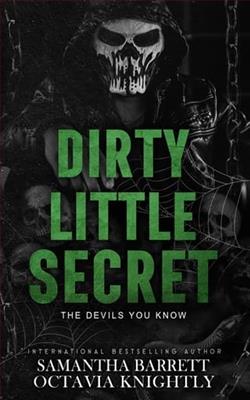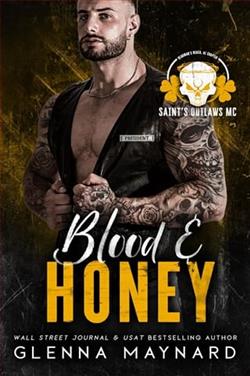Page 49 of The Perfect People
The front door was pulled nearly but not completely closed and they could hear a television in the background. Jessie looked over at her partner and spread out her palms, extending the invitation for the detective to knock. Susannah grimaced but did the honors. When her knuckles rapped on the wood, bits of sand and debris crumbled off and fell to the ground.
“Who is it?” called out a raspy-voiced male.
“LAPD,” she announced, “we’d like a word, Mr. Duff.”
“Here are two for you,” he shouted back. “Screw off!”
Susannah’s face immediately twisted up into a grimace, but Jessie winked at her.
“We knew he was going to be a tough nut to crack,” she whispered before barking, “Just kidding about that. We’re with Publishers Clearing House. You may already be a winner, sir! Don’t you want to claim your prize?”
There was a moment of silence, followed by what was clearly someone getting out of a creaky chair. Seconds later, she heard a sliding sound and a rattle. Then the door opened to reveal a fifty-something-year-old guy in pink board shorts and an unbuttoned, short-sleeved yellow polo shirt.
Everything about him was gray, from the mop of frizzy (some might even say curly) hair on his head to the copious hair on his chest to the stubble on his face, which had several scars. Even his eyes were gray. He wasn’t good-looking exactly, but he had a rough, battle-tested hardness that Jessie could imagine being attractive when it wasn’t terrifying.
He was holding a beer in one hand and a cigarette in the other. He eyed them both as he took a long drag, wiped the sweat off his brow, and offered a grim smile.
“I gave up on ever getting what was mine when Ed McMahon died,” he said solemnly. “Nice to know your organization meets its obligations.”
“We pride ourselves on our credibility,” Jessie said, willing to play along as long as he was. “There are just a few perfunctory questions we’re required to ask before we can determine definitively if you are in fact, already a winner.”
“How did you find me?” he demanded.
“How did the Clearing House find you?” she asked, unsure if he was still participating in their little charade or not.
“No, how didyou—Jessie Hunt, criminal profiler for Homicide Special Section, and your stern-looking partner—find me?” he wanted to know. “How did you know I wouldn’t be at the beach or at one of a dozen bars? How did you know to look me up here instead of at the fancy mansion where my mail gets sent? How did you find me?”
As he spoke, Jessie couldn’t help but notice that despite his shack’s humble appearances, it wasn’t as ramshackle as it first seemed. The interior doors were much more secure than the one they stood at now. And while there were no exterior cameras, she counted at least three mounted in the visible areas of the living room and kitchen. She also saw a high-tech security keypad just inside the entrance.
Suddenly, it occurred to her that the sliding and rattling sounds she’d heard when he’d “opened” the already slightly ajar door were a chain lock and a swing bar door guard. Both were designed to allow the door to be opened just a bit to see who was there. But they provided an additional feature for someone who cared: they gave the illusion that the resident was a casual, devil-may-care type who didn’t bother to close his door when in fact, getting inside was no easy feat.
“Officer Carrie Shaw told us where you’d be,” she answered, deciding it was time to be direct. “She thought you might be able to help us out and we’re in a bit of a time crunch, so we figured we’d dispense with standard procedure and just stop by.”
“I’m surprised Shaw knew my schedule,” Duff said, sounding impressed. “I thought I was a little harder to peg than that.”
“She called it your ‘regrouping’ time,” Susannah said. “You’ve finished the important work of wandering the beach and completed the business of afternoon barhopping but you’re not quite ready to begin the task of the early evening pub crawl. Personally, what she called ‘regrouping’ sounded like ‘nap time’ to me.”
Duff stared at her for a moment before returning his attention to Jessie.
“Your partner’s not great with people, is she?” he noted dryly. “All your carefully cultivated Publishers whatever humor flushed down the drain with one nasty old-guy dig. We’re done here.”
He started to close the door.
“We need your help, Mr. Duff,” Jessie said, more plaintively than she’d intended.
He held the door open just enough for her to see his face.
“Why the hell should I care about what kind of help the cops need from me?” he pressed bitterly. “They didn’t cut me any slack when I needed it.”
“I heard about that,” Jessie said, “and it sounds like you got a raw deal for doing the right thing. But don’t let that stop you from being decent now. You can make a difference. You can save a life.”
“You think I care about that?” he demanded, with a caustic laugh.
“Sure I do,” Jessie shot back. “I think you care about saving your own life, for one. And I think you’re scared, way more scared than you’re letting on.”
“What the hell are you talking about?” he asked, pulling the door open again, his nostrils flaring angrily. Next to Jessie, Susannah stiffened noticeably.
“I think you try to project this image of cool,” Jessie said, “living in this hovel, leaving the door slightly open. But we both know you’ve got locks on the inside in case anyone tries to smash through. I see cameras everywhere in there. Your bedroom door is heavily reinforced. I recognize the brand. It probably cost over five grand. And based on the alarm panel next to the door, I’d say your security system is more advanced than most of the mansions along the Strand. You act casual but you live paranoid, Mr. Duff.”















